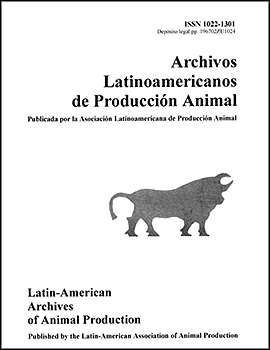
|
Archivos Latinoamericanos de Produccion Animal
Asociacion Latinoamericana de Produccion Animal
ISSN: 1022-1301
EISSN: 1022-1301
Vol. 14, No. 2, 2006, pp. 49-55
|
 Bioline Code: la06007
Bioline Code: la06007
Full paper language: English
Document type: Research Article
Document available free of charge
|
|
|
Archivos Latinoamericanos de Produccion Animal, Vol. 14, No. 2, 2006, pp. 49-55
| es |
Desempenho e indicadores de estresse térmico em bezerras alimentadas com sucedâneo lácteo Com ou sem probiótico no semi-árido Brasileiro
P. O. Lima, A. A. Moura, D.A. Façanha, M. M. Guilhermino
Resumen
Um experimento foi conduzido para estudar os efeitos do uso de substituto do leite, com e sem a adição de probióticos acidificantes, até a desmama com 6 semanas de idade e das condições climáticas na região semi-árida durante 4 meses de verão seco sobre ao desempenho de bezerras mestiças (Holstein x Guzerá) de 7 a 60 dias de idade. Num experimento fatorial com dois tratamentos: abrigos individuais com completa proteção solar e abrigos individuais com sombra suplementar de árvores e o uso ou não de probióticos (4 tratamentos), o efeito no ganho de peso, ingestão de água e de matéria seca, freqüência cardíaca, freqüência respiratória e temperatura retal foram determinados. Os resultados mostraram que a provisão suplementar de sombra foi desnecessária uma vez que seu pequeno efeito sobre a temperatura ambiente não afetou o desempenho animal; nem o uso de probióticos durante a estação seca beneficiou a saúde e o desempenho das bezerras provavelmente devido a pouca exposição dos animais à agentes infecciosos ao contrário do que normalmente ocorria na estação das águas. As condições climáticas observadas, da mais alta temperatura máxima diária de ambiente pela manhã (34°C) e da tarde (36,2°C) e a baixa umidade relativa do ar (46 a 67%) não produziu sinais de desconforto térmico como indicado pelos parâmetros fisiológicos observados.
Palabras-clave
Bezerras Mestiças, Consumo de alimentos, Abrigos, Substituto do Leite
|
| |
| en |
Performance and indicators of thermal stress in heifer calves fed a milk replacer with or without a probiotic in a semi-arid region of Brazil
P. O. Lima, A. A. Moura, D.A. Façanha, M. M. Guilhermino
Abstract
An experiment was conducted to study the effects of feeding a milk replacer with or without addition of an acidifying probiotic until weaning at 6 weeks of age, and of climatic conditions in a semi-arid region during four dry summer months on the performance of female crossbred (Holstein x Guzera) calves from 7 to 60 days of age. In a factorial arrangement of two principal treatment factors in complete protection against solar radiation in individual hutches, versus supplemental tree shade for the hutches, and use or not of the probiotic (four treatments), the effects on liveweight gain, intake of water and of dry matter, heart rate, respiration rate, and rectal temperature were determined. The results showed that provision of supplementary shade was unnecessary since its small effect on the environmental temperature did not improve animal performance; neither did use of the probiotic during the dry season benefit health and performance of the calves, probably because of little animal exposure to infectious agents, unlike what commonly occurs in the rainy season. The climatic conditions recorded of high maximum daily ambient temperature in the morning (34°C) and afternoon (36.2°C) but low relative humidity (46 to 67%) did not produce signs of thermal discomfort as indicated by the physiological indicators recorded.
Keywords
Crossbreed Calves, Feed Intake, Milk Replacer, Shelters
|
| |
© Copyright 2006 - ALPA. Arch. Latinoam. Prod. Anim.
Alternative site location: http://www.alpa.org.ve/ojs/index.php
|
|
